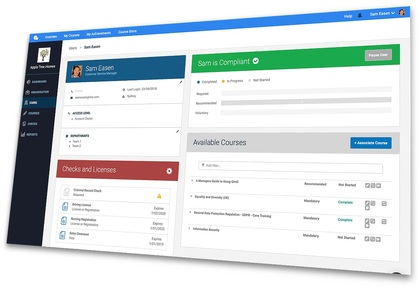Home care agencies urged to prioritise digital training during pandemic
Home care agencies have been advised by Skills for Care to opt for digital rather than face-to-face training during the coronavirus pandemic to ensure care workers are up to date with skills.

With the easing of lockdown restrictions in the UK, Skills for Care published guidance in July on training of care workers in England, stating that it still encourages digital training during the pandemic.
Pandemic sees Skills for Care back digital training
Skills for Care urges care providers to consider whether training can be provided online, either remotely using webinars or video conferencing, or via e-learning before delivering face-to-face training.
Skills for Care’s July guidance stated: ‘With the government beginning to ease lockdown and changes to advice about returning to work, we have reviewed and updated our guidance on face-to-face training for the social care workforce.
‘The priority must be the safety and protection of people who access care and support services and workers who are providing care and support. During this period, we encourage you to use digital solutions to deliver and access training, as far as is practicable.’
'Possibility to monitor my carers' progress'
Home care firm Homecare Scotland has adopted digital training for its staff and is using the Qintil website to connect care bosses to their workers’ training, learn skills and manage training and compliance overall.
 Marta Kantor, branch manager, Homecare Scotland said: “Qintil is the perfect website for getting an induction to care.
Marta Kantor, branch manager, Homecare Scotland said: “Qintil is the perfect website for getting an induction to care.
“Qintil has a lot of courses to do online which prepare you for care work and enable you to update your skills.
“For me, access to Qintil gives me the possibility to monitor my carers’ progress with their courses. This allows us to improve cooperation between departments and prevent a possible reduction of employees."
Qintil is a learning and compliance management system for home care providers, which has thousands of courses, video classroom and document management features. It also enables home care organisations to keep staff certificates, documents and registrations together.

Sam Easen, director of Qintil, said: "We built Qintil so that you can find, share and manage everything that's essential for work. This all helps employers and the learners.
“Now there's an easy way to get a record of new hires' learning and documents and to deliver their own training from any source.
“Everyone knows where they are with their compliance and training at all times, without the need to jump from one platform to the next."
Latest News
 29-Jul-24
Dementia Bus gives carehome.co.uk staff insight into life with dementia
29-Jul-24
Dementia Bus gives carehome.co.uk staff insight into life with dementia
 27-Jul-23
UK's top home care agencies in 2023 revealed
27-Jul-23
UK's top home care agencies in 2023 revealed
 30-Nov-22
A quarter of older people keep their falls secret from family
30-Nov-22
A quarter of older people keep their falls secret from family
 29-Nov-22
'Covid-19 has not gone away' say terminally ill
29-Nov-22
'Covid-19 has not gone away' say terminally ill
 28-Nov-22
IT consultant who received poor care opens 'compassionate' home care business
28-Nov-22
IT consultant who received poor care opens 'compassionate' home care business